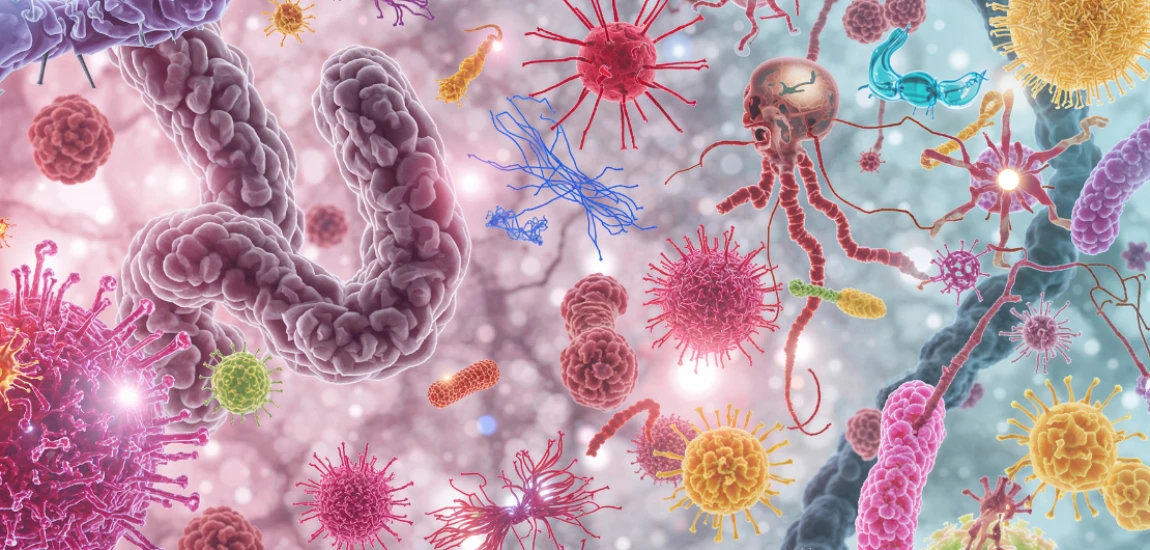Microbiomes and You: How Gut Health Impacts the Brain and Immunity

For decades, conversations about health revolved around nutrition, exercise, and genetics. While these remain critical, research is now shining a spotlight on something often overlooked: the microbiome. The gut microbiome refers to the trillions of bacteria, fungi, and other microorganisms living in your digestive tract. Far from being passive passengers, these microbes play an essential role in digestion, immunity, and even how your brain functions.
Scientists often call the gut the body’s “second brain” because of its vast network of neurons and its constant communication with the central nervous system through the gut-brain axis. In fact, many mental health conditions—including anxiety and depression—have been linked to imbalances in gut bacteria. At the same time, over 70% of the immune system resides in the gut, meaning its health has a direct impact on how well your body fights off infections and diseases.
This blog explores the fascinating connection between microbiomes, the brain, and immunity. You’ll discover how gut health influences mood, memory, and resilience, while also learning practical ways to strengthen your microbiome for long-term well-being. From diet and lifestyle changes to cutting-edge research, the science is clear: taking care of your gut means taking care of your whole self.
The Gut-Brain Connection: How Microbiomes Shape Mood and Mental Health
The relationship between the gut and brain is more than a metaphor—it’s a two-way street of biochemical communication. This gut-brain axis involves neural, hormonal, and immune pathways. Microbes in the gut produce neurotransmitters like serotonin, dopamine, and gamma-aminobutyric acid (GABA), all of which influence mood regulation, stress response, and cognitive function. In fact, an estimated 90% of serotonin—the “feel-good” chemical—is produced in the digestive tract, not the brain.
When the gut microbiome is imbalanced, often due to poor diet, antibiotics, or chronic stress, it can trigger inflammation and disrupt these chemical signals. Studies have shown that people with depression and anxiety often exhibit lower levels of beneficial gut bacteria. Likewise, conditions such as irritable bowel syndrome (IBS) have been closely linked to mental health issues, highlighting just how interconnected these systems are.
Emerging therapies like psychobiotics—probiotics specifically designed to support mental well-being—are showing promise. For example, strains like Lactobacillus and Bifidobacterium have been studied for their ability to reduce anxiety symptoms and improve mood. Similarly, dietary fiber, which feeds gut bacteria, has been associated with improved emotional resilience.
What does this mean for you? By nurturing your gut through diet and lifestyle, you may positively influence not just your digestion but also your mental health. Incorporating fermented foods like yogurt, kefir, kimchi, and sauerkraut into your meals could boost beneficial bacteria. Pairing these with prebiotic-rich foods such as garlic, onions, and bananas provides the “fuel” your microbiome needs to thrive.
The bottom line: a balanced microbiome doesn’t just aid digestion—it directly contributes to sharper thinking, greater emotional balance, and a more resilient mind.

Gut Health and Immunity: The First Line of Defense
Beyond its role in mood, the gut microbiome plays a central role in immunity. Roughly 70% of your immune cells live in the gut, constantly interacting with microbes to distinguish between friend and foe. A healthy microbiome helps regulate inflammation, defend against harmful pathogens, and even train your immune system to respond appropriately.
When your gut bacteria are diverse and balanced, they create a protective barrier along the intestinal wall. This prevents harmful substances, like toxins or undigested food particles, from leaking into the bloodstream—a condition often referred to as “leaky gut.” If this barrier is compromised, it can trigger chronic inflammation, which has been linked to autoimmune diseases, allergies, and even cancer.
The microbiome also influences how your body responds to vaccines and infections. For example, studies have found that individuals with robust gut health show stronger responses to the flu vaccine compared to those with imbalanced microbiota. Similarly, gut bacteria can enhance your body’s ability to fight off viral and bacterial infections by producing antimicrobial compounds.
Diet again plays a crucial role in supporting immune resilience. Diets rich in processed foods, sugar, and unhealthy fats tend to reduce microbiome diversity and promote inflammation. On the other hand, plant-based diets filled with fruits, vegetables, whole grains, and legumes support a healthier immune response.
Interestingly, the overuse of antibiotics—while lifesaving in many cases—can significantly harm the microbiome. This disruption weakens immune defenses, making recovery slower and increasing susceptibility to new infections. That’s why healthcare experts increasingly recommend pairing antibiotics with probiotics to restore microbial balance.
In short, a thriving microbiome is your body’s natural armor. By protecting and nurturing it, you’re not just supporting digestion but also building a stronger, more resilient immune system.

Practical Tips to Improve Gut Health for a Healthier Brain and Body
Understanding the importance of microbiomes is only half the battle—the real impact comes from actionable steps you can take daily. The good news? Small, consistent lifestyle changes can dramatically improve your gut health, brain function, and immunity.
Eat a Diverse Diet
Diversity in food translates to diversity in microbes. Aim to include a variety of fruits, vegetables, whole grains, nuts, and legumes. Each food group introduces different fibers and nutrients that feed unique microbial species, creating a balanced ecosystem in your gut.
Incorporate Probiotics and Prebiotics
Probiotics (found in fermented foods and supplements) introduce beneficial bacteria, while prebiotics (fibers in foods like garlic, leeks, and asparagus) provide the fuel they need to thrive. Together, they create a powerful foundation for gut health.
Limit Processed Foods and Excess Sugar
Processed foods often contain additives and preservatives that disrupt microbial balance. High sugar intake encourages the growth of harmful bacteria and yeast, leading to inflammation and digestive issues.
Manage Stress and Prioritize Sleep
Stress and poor sleep can alter gut microbiota, weakening the gut-brain connection. Practices like meditation, yoga, or even a daily walk can reduce stress, while consistent sleep schedules promote microbial balance.
Be Cautious with Antibiotics
Only take antibiotics when necessary and always under a doctor’s supervision. When prescribed, support recovery with probiotic supplements or fermented foods to help restore balance.
Stay Hydrated
Adequate water intake supports digestion and nutrient absorption, while also helping maintain the protective mucus lining in your intestines that supports microbiota health.
By following these strategies consistently, you create a gut environment that not only supports digestion but also empowers your mind and immune system to function at their best.





